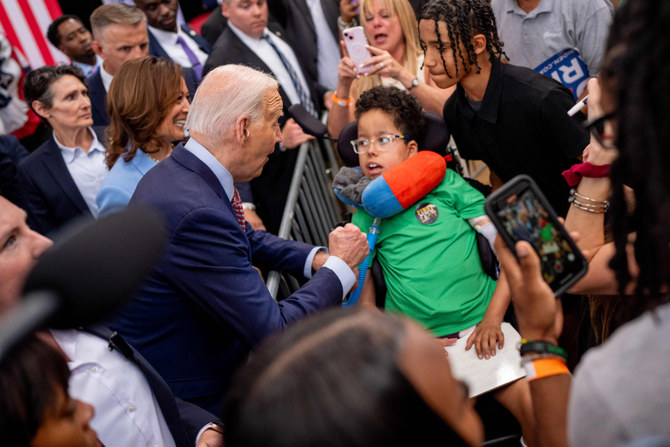PHILADELPHIA: President Joe Biden renewed his election-year pitch to Black voters on Wednesday, lashing out at Donald Trump’s “MAGA lies” and saying the winner of this year’s White House race will make crucial decisions, including on nominees for the Supreme Court, that could affect the country for decades.
Biden and Vice President Kamala Harris, in a joint appearance at a Philadelphia boarding school, thanked Black voters in Pennsylvania and beyond for being the lynchpin to their 2020 victory and they made the case that their agenda has had an enormous impact on improving lives for Black voters.
The Democratic president also argued that an “unhinged” Trump is peddling misinformation in an effort to win back the White House.
“I’ll be damned if I’m going to let Donald Trump turn America into a place of anger, resentment and hate,” Biden said, calling on the crowd to help him and Harris win a second term. “My question is a simple one: Are you with me?”
At Girard College, which has a predominantly Black student body, Biden warned about the threat he said a second Trump presidency would pose and cited some of the racial controversies fanned by the presumptive Republican nominee during his life.
“This is the same guy who wanted to tear gas you as you peacefully protested George Floyd’s murder. The same guy who still calls the Central Park Five guilty, even though they were exonerated,” Biden told the crowd. “He’s that landlord who denies housing applications because of the color of your skin.”
The Philadelphia visit was the start of what the Biden campaign describes as a summerlong effort to engage Black student organizations, community groups and faith centers. It reflects in part how much of their support of him has frayed as Trump aims to make inroads into the longtime Democratic constituency.
The issue of abortion rights and the judiciary also featured in the remarks from Biden and Harris. Biden pledged to codify the protections of Roe vs. Wade, the now-nullified Supreme Court decision that had legalized the right to an abortion, if he and enough Democratic lawmakers are elected, while Harris noted that Trump dramatically shaped the Supreme Court as she invoked the name of Thurgood Marshall, the high court’s first Black justice.
Trump, she said, “handpicked three members of the Supreme Court — the court of Thurgood — with the intention that they would overturn Roe vs. Wade,” the landmark abortion rights ruling. “And as he intended, they did.”
“Who sits in the White House matters,” she said.
Underscoring that point later, Biden said the next president is “going to be able to appoint a couple justices.” With some vacancies on the Supreme Court, Biden said he could “put in really progressive judges, like we’ve always had.”
“Tell me that won’t change your life,” he said.
Among Black adults, Biden’s approval has dropped from 94 percent when he started his term to just 55 percent, according to an Associated Press-NORC Center for Public Affairs Research poll published in March.
The economy has been a particular thorn in Biden’s side since 2022, when inflation hit a 40-year high. But there have also been signs of discontent in the Black community more recently over Biden’s handling of the seven-month Israel-Hamas war.
Turning out Black voters could prove pivotal for Biden’s chances in what’s expected to be among the most closely contested states — Arizona, Georgia, Michigan, Nevada, Pennsylvania and Wisconsin. Biden beat Trump in all six states in 2020, but he could face a more difficult climb this year.
Trump has been offering himself as a better president for Black voters than Biden. At a rally last week in the Bronx, he railed against Biden on immigration and said “the biggest negative impact” of the influx of migrants in New York is “against our Black population and our Hispanic population who are losing their jobs, losing their housing, losing everything they can lose.”
The Republican National Committee zeroed in on gas prices and food costs under Biden’s presidency as it attacked his stop in Pennsylvania.
“No matter how much Biden lies, he cannot gaslight Pennsylvanians into supporting him — his approval ratings are abysmal,” RNC Chair Michael Whatley said. “President Trump continues to lead in polls in Pennsylvania and across the country. Pennsylvanians are ready to Make America Great Again, and they will vote for President Donald J. Trump in November.”
The Biden campaign wants to use the new engagement effort in part to remind Black voters of some of the Democratic administration’s achievements during his term. On Wednesday, Biden repeated the refrain “because you voted” as he rattled off a litany of his accomplishments for Black Americans, including record funding for historically Black colleges and universities, forgiveness of federal student loan debt and pardons for simple possession of marijuana.
“Black voters placed enormous faith in me,” Biden said. “I’ve tried to do my best to honor that trust.”
Biden later visited with Black business owners at SouthSide, an event space, and greeted supporters there while continuing to tout his accomplishments for Black voters and, in particular, the economic gains under his presidency. In the more intimate gathering, jointly hosted by the African-American Chamber of Commerce of Pennsylvania, New Jersey, and Delaware, he also stressed to the crowd that “there’s not a damn thing that a white man can do that a Black man can’t do, or do better.”
The Black unemployment rate sits at 5.6 percent, according to the latest federal government data, compared with an average of about 8 percent from 2016 to 2020 and 11 percent from 2000 to 2015. Black household wealth has surged, and Biden’s effort to cancel billions in student loan debt has disproportionately affected Black borrowers.
Biden also points to his appointment of Ketanji Brown Jackson as the first Black female justice on the US Supreme Court and his pick of Harris as the first Black woman to serve as vice president.
The president’s visit to Philadelphia follows a series of engagements with Black community members in recent weeks, including hosting plaintiffs in the 1954 Supreme Court decision that struck down institutionalized racial segregation in public schools, a commencement address at Morehouse College in Atlanta, and a virtual address to the Rev. Al Sharpton’s racial justice conference.






























